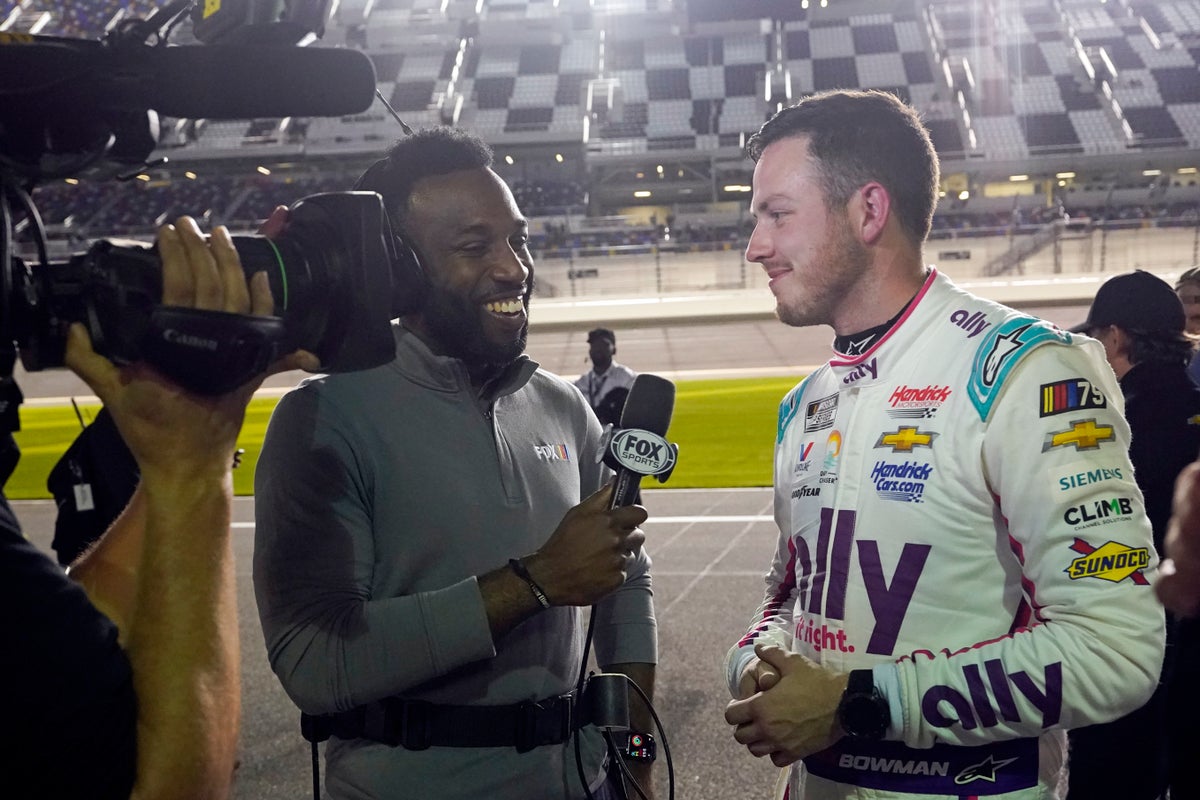
When Josh Sims reports on NASCAR this season, the stock car series these days -- from the garage to the grandstands to top brass -- looks more like him.
Yes, Sims takes pride in the fact that he will become the first Black pit reporter for the Daytona 500 and that his rapid rise at Fox has made him one of the primary faces of the network’s NASCAR coverage.
More than that, Sims sees that NASCAR may finally be running out of unconquered firsts for people of color. For women. For any minority who perhaps has experienced an uneasy relationship with a series founded in the South 75 years ago, a generation before the civil rights era.
Sims’ journey from NASCAR novice through a sports anchor gig in Charlotte, North Carolina, that sparked his passion in the sport had led to his biggest assignment yet: pit reporting as a Black man from one of auto racing’s signature events.
“I never set out to be a first,” the 35-year-old Sims said. “I never set out to make history. I just wanted to be the best at what I was doing, whether it was hosting or reporting. At the same time, I kind of understand the platform and what it means for me to be doing this.”
Sims has a full workload this season. He is the Cup Series pit reporter, teams with Regan Smith as an Xfinity Series reporter and is part of the host rotation for the FS1 show “Race Hub.”
And this season, he wants to share the stories on what he sees at the track beyond the in-race reports and fantastic finishes. Minorities may not necessarily become the dominant demographic for the series, but they can certainly grab a larger share of the marketplace.
“I think if more people out there saw it, saw people that looked them, instead of just driver, crew chief, you might be more inclined to feel like, hey, I feel a little more comfortable going to the track,” Sims said. “Getting that out there might help in terms of more people coming to the track and getting more different faces to the stands. It’s not necessarily about getting more people in, it’s showing what you already have.”
It was, of course, a very low bar but the garage and grid and fans certainly appears to be more diverse now than before 2020 when NASCAR banned the Confederate flag from its tracks and properties. NASCAR is still overwhelmingly white, but NASCAR President Steve Phelps isn’t exaggerating when he says you notice the change when walking through the garage.
“I think the events of 2020 allowed the sport to get younger and more diverse,” he said at his state-of-the sport address in November.
Among the notable achievements: Jusan Hamilton, who last year became the first Black race director in Daytona 500 history, will do it again this season. Amanda Oliver, a Black woman, negotiates high-profile deals as NASCAR’s senior vice president. John Ferguson, a Black man, is the chief human resources officer.
Owners now include Pitbull and Michael Jordan, whose team features Bubba Wallace, the Black driver who prompted the flag ban. Rising stars in the developmental series include Rajah Caruth, a 20-year-old graduate of the “Drive for Diversity” program.
Phelps said NASCAR was committed to strengthening ties to various programs that can attract a broader fan base, from Boys & Girls Clubs to “some of the other areas we have from a partnership standpoint that really speak to what’s happening in the African American community, what’s happening in the Hispanic, Latino community (to) what’s happening in the LGBTQ community.”
While the frequently toxic nature of social media makes it easier for haters to reach Sims and others, he’s a popular personality each weekend at the track.
“I never necessarily felt uncomfortable,” he said. “You get stuff here and there in terms of messages that’s emailed to you or sent to you but that’s par for the course if you’re a minority in the sport, a woman in the sport, even white drivers get stuff like that. But for every one or two of those, I get a lot more stuff from people excited that I’m here. You know, focus on the good.”
Raised in East Brunswick, New Jersey, Sims is a Villanova graduate who followed the Wildcats in NCAA Tournament games in 2009 and remained a fan of most Philly teams.
“I grew up in Jersey, so not exactly NASCAR country,” Sims said. “Growing up, you know the Jimmies and the Dale Seniors and the Tony Stewarts and everybody but it wasn’t something I followed week in and week out.”
His interest in NASCAR picked up in 2015 when he moved to Charlotte and hosted a pre-race show on the local Fox affiliate. Sims covered his first Daytona 500 in 2016 when Denny Hamlin nipped Martin Truex Jr. in the closest finish in race history.
“I was like, I am all in,” Sims said.
Charlotte can feel like a small town for a city and Sims kept bumping into friends and contacts in NASCAR. Fox Sports executives hired Sims in 2021 as a reporter for their slate of NASCAR shows. He also became the first Black pit reporter in any NASCAR series, for Trucks races.
“I kind of hope that young people that look like me, can see me doing it and now recognize that it’s possible,” Sims said. “I hope I can kind of blaze a trail for them to one day say, hey, because Josh Sims did it, I can do it, too. And that’s what’s important.”
___
AP Images blog on 75 years of NASCAR: https://apimagesblog.com/historical/2023/2/nascar-75







